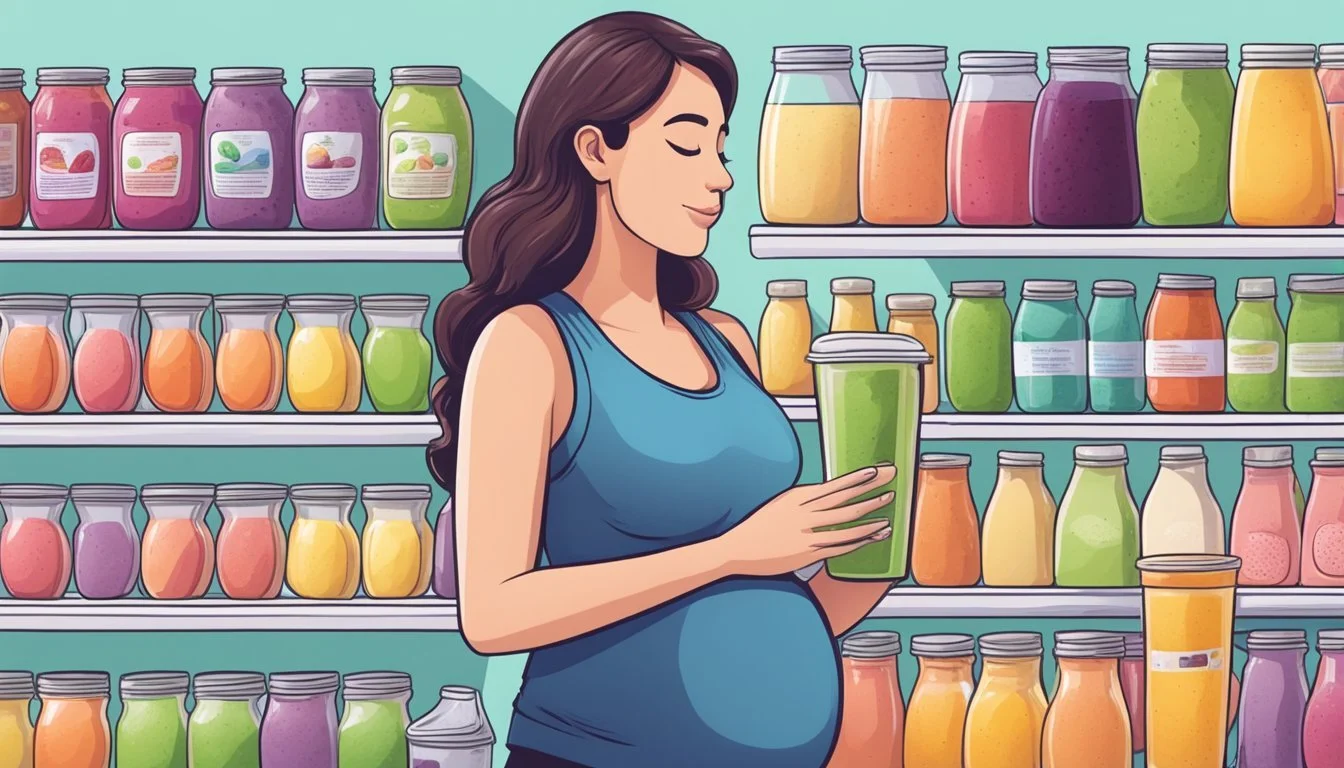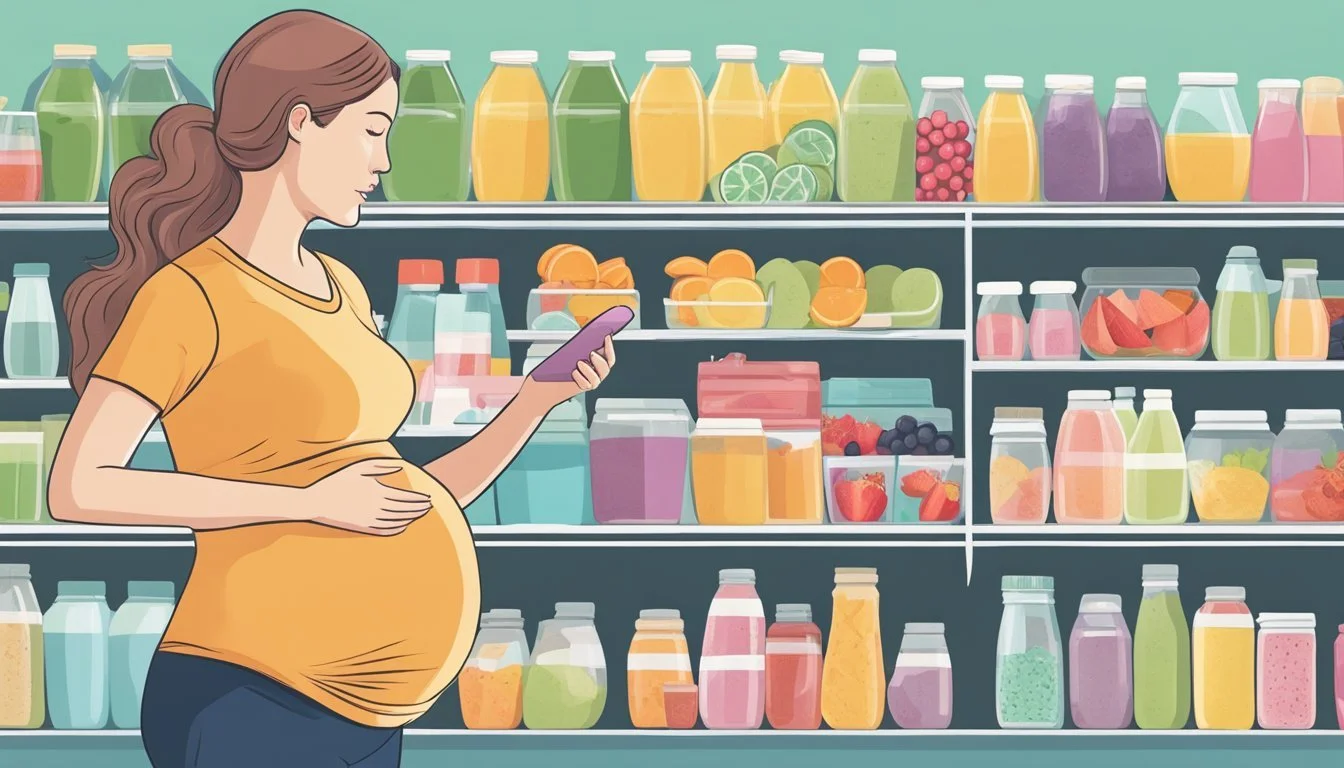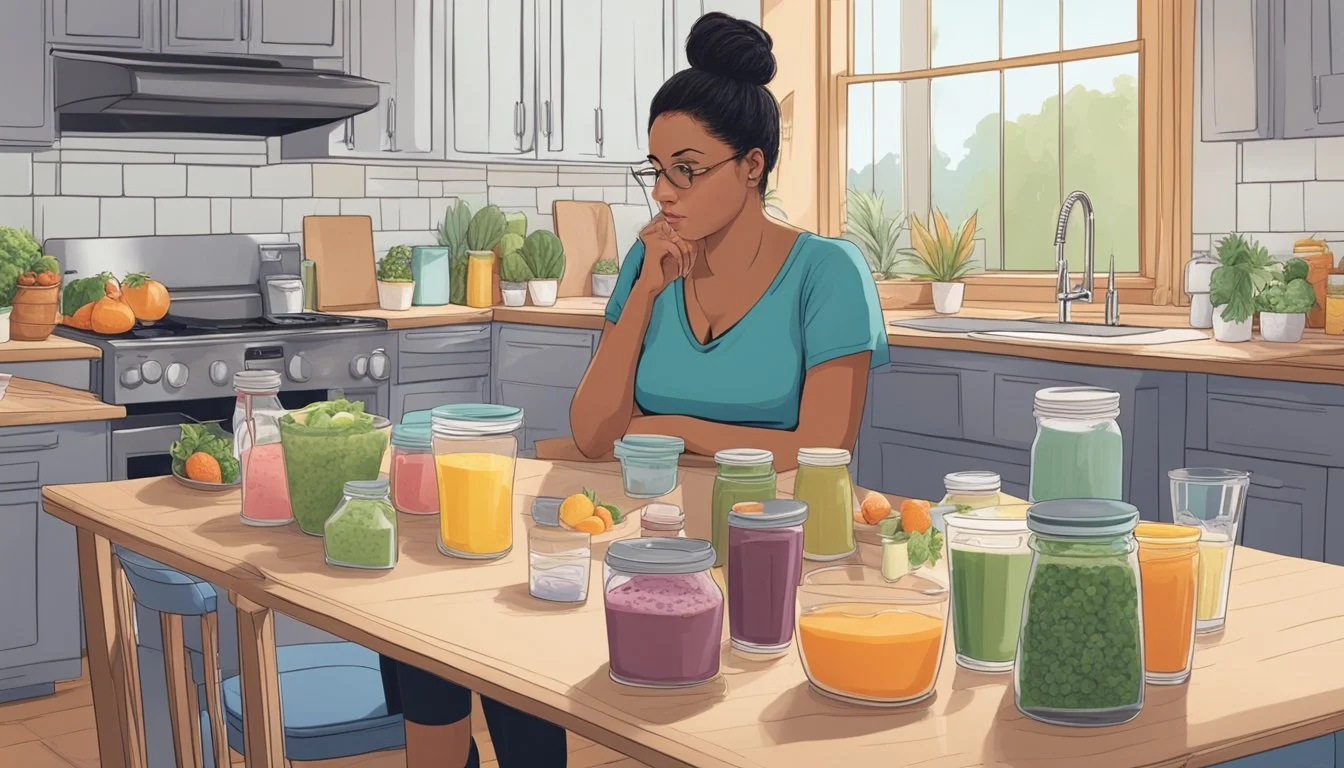Can Pregnant Women Eat Store-Bought Smoothies?
Unraveling the Truth for Expectant Mothers
Pregnant women often seek out nutritious and convenient options to supplement their diet, and smoothies can be an excellent choice. These blended beverages offer a way to consume a variety of fruits, vegetables, and other nutrient-dense foods in one sitting. When it comes to store-bought smoothies, it is generally safe for expectant mothers to indulge in them as long as they are made with pasteurized ingredients and prepared in hygienic conditions. Pasteurization is crucial because it reduces the risk of foodborne pathogens, which pregnant women are particularly susceptible to due to changes in their immune system.
Smoothies tailored for pregnancy are typically packed with essential nutrients that benefit both the mother and the developing baby. Ingredients like kale, mango, and pineapple are not only vibrant and flavorful but also provide vitamins, fiber, and antioxidants. However, caution is advised when selecting store-bought options, as they can sometimes contain added sugars and preservatives that are not ideal for a pregnancy diet. It is important for pregnant women to read labels carefully or opt for making smoothies at home where they have full control over the ingredients used.
Ultimately, while store-bought smoothies can be a part of a healthy prenatal diet, they should be chosen with care. Pregnant women should look for options that favor natural fruits and vegetables, minimal added sugars, and adhere to safety standards to ensure they are consuming a product that is as beneficial as it is convenient.
Nutritional Considerations for Pregnant Women
During pregnancy, a woman's body requires additional nutrients, vitamins, and minerals to support the health and growth of the developing fetus. It is essential to understand which ingredients provide substantive nutritional benefits to ensure both mother and baby receive the necessary nourishment.
Importance of Nutrients in Pregnancy
Pregnant women have unique nutritional requirements to support fetal development and their own well-being. Protein, for instance, is crucial as it helps in the baby's growth, particularly in the second and third trimesters. Iron is needed to supply oxygen to the baby, and iron deficiency could lead to anemia and preterm delivery. Adequate hydration is also vital for increasing blood volume and amniotic fluid.
Calcium is necessary for building the baby's bones and teeth.
Folic acid helps prevent neural tube defects and is important early in pregnancy.
Omega-3 fatty acids, especially DHA, contribute to the baby's brain and eye development.
Additionally, a balanced intake of vitamins and minerals such as Vitamin C, potassium, Vitamin A, Vitamin E, and Vitamin K are essential to support the immune system and cell development. Fiber can help maintain bowel health and reduce the risk of constipation, a common issue in pregnancy.
Identifying Healthy Ingredients
When evaluating store-bought smoothies or any other food product, pregnant women should look for items rich in nutrients that are fundamental during pregnancy. It is beneficial to check for:
Fiber-rich fruits like bananas, berries, and apples.
Leafy greens such as spinach, kale, which provide fiber, vitamins, and minerals.
Healthy fats from ingredients like avocado or natural nut butters, providing essential fatty acids.
Protein sources, like Greek yogurt or nut butters, which are also good sources of calcium.
Hydration from the liquid base of the smoothie, preferably water or milk, which also adds to the calcium intake.
Incorporating a variety of these ingredients into their diet can help pregnant women get a wide spectrum of antioxidants, which protect against cellular damage, and other important nutrients like potassium, which supports heart health and muscle function.
Benefits of Specific Ingredients for Pregnancy
When selecting ingredients for smoothies, pregnant women should consider both the nutritional value and safety of each item. This section discusses the benefits of specific ingredients that can contribute to a healthy pregnancy diet.
Benefits of Berries
Strawberries, blueberries, and other berries are rich in antioxidants, vitamins, and fiber, which are crucial for both maternal health and fetal development. The high vitamin C content in berries like strawberries can aid in iron absorption when consumed with iron-rich foods.
The Role of Greens in Pregnancy
Leafy greens such as spinach and kale are packed with vitamins A, C, K, and folate. Folate is especially important early in pregnancy to help reduce the risk of neural tube defects. Adding greens to smoothies can be an easy way to increase a pregnant woman's intake of these vital nutrients.
Incorporating Protein Sources
Protein supports the growth of fetal tissue, including the brain, and helps with breast and uterine tissue growth during pregnancy. Ingredients like chia seeds, flax seeds, and nut butters provide protein along with beneficial omega-3 fatty acids, which are important for fetal brain development.
Healthy Fats and Their Importance
Healthy fats are essential for fetal growth, particularly brain development. Avocado, a common smoothie ingredient, supplies heart-healthy monounsaturated fats and is also a valuable source of fiber. Nuts and nut butters offer a healthy dose of these fats as well.
Managing Sugar Intake with Fruits
While fruits like mango, banana, and apple provide essential nutrients and sweetness to smoothies, it is important to manage sugar intake. Dates and frozen fruit can serve as natural sweeteners in lieu of added sugars, thus also contributing additional fiber and nutrients.
Selecting Safe Store-Bought Smoothies
When pregnant women choose store-bought smoothies, safety and nutritional content are paramount. These selections can provide essential nutrients while also offering relief from common pregnancy symptoms such as morning sickness and constipation.
Understanding Food Safety During Pregnancy
Pregnant women should assess the safety of store-bought smoothies with an emphasis on pasteurization and cleanliness. Listeria, a bacteria found in unpasteurized products, poses a significant risk during pregnancy. Smoothies should only be purchased from reputable sources that follow strict hygiene standards. Hydration is crucial, and smoothies can contribute to a pregnant woman's fluid intake, but this must be balanced with careful evaluation of the beverages' components and preparation.
Key pointers for selecting safe store-bought smoothies:
Ensure all dairy or juice ingredients are pasteurized
Verify the cleanliness of the establishment
Favor locations with high product turnover to ensure freshness
Reading Labels and Ingredients
Understanding ingredient labels is a critical skill for pregnant women selecting store-bought smoothies. They should look for smoothies containing ingredients like kale, ginger, and certain fruits that offer vitamins, fiber, and may help with nausea and constipation. Ingredients lists should be short and free from additives or excessive sugars.
Nutrients beneficial during pregnancy:
Fiber: Aids in digestion, potentially reducing constipation
Probiotics: Can improve gut health, which is important for a woman and her baby
Vitamins: Essential for baby's development and can ameliorate morning sickness
Pregnant women should avoid smoothies that contain herbal supplements or a large number of unfamiliar ingredients, as these might not be safe for consumption during pregnancy. A simple, transparent ingredient list is a hallmark of a safer choice.
Homemade Smoothie Advice
When crafting smoothies at home, particularly during pregnancy, it's important to focus on nutrient-rich ingredients and adapt recipes to accommodate dietary needs while ensuring balanced nutrition is maintained.
Recipe Tips for Pregnancy-friendly Smoothies
Creating smoothies during pregnancy can be both a nutritious and delicious way to support prenatal health. It's beneficial to include protein sources such as Greek yogurt, cottage cheese, or protein powders to help meet the increased protein requirements. Furthermore, integrating fruits like frozen mango and avocados not only adds flavor but also provides essential vitamins and healthy fats.
Example Pregnancy Smoothie Recipe:
1 cup frozen mango chunks
1/2 ripe avocado
2 tablespoons Greek yogurt
1 cup coconut milk
1 teaspoon honey
Optional: 1 tablespoon of hemp seeds or oats for added fiber
Mix all ingredients in a blender until smooth, ensuring a well-balanced meal replacement or snack.
Alternative Ingredients for Dietary Restrictions
Those with dietary restrictions can find ample alternatives for traditional smoothie ingredients. For a vegan option, use soy milk or almond milk in place of dairy. Hemp seeds and vegan protein powders are excellent for adding protein. To incorporate healthy fats without dairy, consider coconut oil or avocados.
Dairy-Free and Vegan Ingredient Swaps:
Replace Greek yogurt with silken tofu or soy yogurt.
Opt for maple syrup or agave nectar instead of honey.
Choose plant-based milks like almond, soy, or coconut milk over cow's milk.
Ensuring Balanced Nutrition
A well-rounded smoothie for a pregnant individual should contain a balance of macronutrients: carbohydrates, proteins, and fats, along with a variety of vitamins and minerals. Use lemon juice or galette cheese for added vitamin C and calcium, respectively. To ensure that smoothies remain nutrient-dense, one might avoid excessive sugars and opt for natural sweeteners like honey in moderation. Including oats can add fiber and help provide sustained energy.
Nutrient Balance Checklist:
Protein: Greek yogurt, cottage cheese, or protein powders
Fats: Avocados, coconut oil, nuts or seeds (e.g., hemp seeds)
Carbohydrates: Oats, frozen fruit (mango, berries)
Vitamins & Minerals: Add a variety of colorful fruits and leafy greens
By following these guidelines, smoothies made at home can support the nutritional needs of pregnant individuals effectively.
Pregnancy-related Health Concerns and Smoothies
When considering store-bought smoothies, pregnant women need to be mindful of their unique nutritional needs and potential health concerns. Smoothies can be an excellent source of nutrients but also pose risks if not chosen carefully.
Combating Morning Sickness with Smoothies
Morning sickness is a common obstacle during pregnancy, and smoothies can serve as a soothing snack. Ingredients such as ginger are known for their anti-nausea properties, making them a beneficial addition. A simple blend containing ginger, banana, and a mild liquid base like almond milk can help alleviate nausea while providing essential nutrients.
Addressing Common Digestive Issues
Pregnant women often face digestive issues such as constipation due to hormonal changes. Smoothies that are high in fiber can aid digestion and maintain regularity. For example:
Oatmeal: A source of soluble fiber, it can be added to smoothies for digestive support.
Berries and Greens: These are natural sources of fiber that enhance gut motility.
Incorporating ingredients like chia seeds or flaxseeds can also boost the fiber content of a smoothie to support a healthy digestive system.
Boosting Energy and Curbing Hunger
Maintaining energy levels and managing hunger is critical during pregnancy. Smoothies can be calorie-dense and nutrient-rich snacks that sustain energy throughout the day. Key components to include are:
Ingredients Benefit Nut Butters Provide healthy fats and protein for satiety. Leafy Greens Offer iron and vitamins for energy. Greek Yogurt Adds protein and can help control hunger pangs.
These can be mixed with fruits like bananas or avocados for added texture and nutritional value, creating a well-rounded snack that meets the increased caloric needs of pregnancy.
Additional Tips for Smoothie Consumption in Pregnancy
When pregnant, women should consider smoothie ingredients carefully to support their hydration levels, manage calorie intake, and boost nutrition with superfoods.
Tips for Staying Hydrated
Hydration is crucial during pregnancy, and smoothies can be an excellent source of fluids. Women should aim to include ingredients with high water content such as cucumbers or watermelon. To boost hydration:
Incorporate at least one hydrating fruit or vegetable per smoothie.
Limit or avoid caffeine, which can lead to increased urination and hence fluid loss.
Understanding Portion Sizes and Frequency
Smoothies can be quite filling and high in calories. Pregnant women should monitor:
Portion sizes: A suitable serving size might be about 8 to 12 ounces.
Frequency of consumption: Ideally, smoothies should complement meals rather than replace them, to ensure a balanced intake of other essential nutrients.
Incorporating Superfoods for Extra Nutrition
Superfoods can turn a regular smoothie into a powerhouse of nutrients. Pregnant women may consider adding:
Chia seeds, flax seeds, or hemp seeds: These are rich in omega-3 fatty acids and fiber.
A variety of berries for antioxidants, which protect cells from damage.
Green leafy vegetables: Providers of B vitamins and a range of micronutrients.
By following these tips, pregnant women can enjoy smoothies as a hydrating, nutritionally rich snack that supports both their health and that of their developing baby.
Potential Risks and Considerations
When considering store-bought smoothies, pregnant women must be aware of specific ingredients that could pose risks and take into account potential allergens which might affect food safety during pregnancy.
Avoiding Certain Ingredients During Pregnancy
Pregnant women should be vigilant about certain ingredients commonly found in store-bought smoothies. Some key ingredients to watch out for include:
Raw sprouts: They can carry harmful bacteria like Salmonella and E. coli.
Unpasteurized juice: It may contain pathogens that can cause foodborne illness.
Certain herbal supplements: Ingredients like raw aloe or unpasteurized apple cider vinegar may not be safe during pregnancy.
High quantities of certain vitamins and minerals: Excessive intake could interfere with a prenatal vitamin regimen.
Excess caffeine: Some smoothies may contain energy-boosting ingredients high in caffeine, which should be limited during pregnancy.
Added sugars: High sugar content can contribute to gestational diabetes.
It's also recommended that pregnant women avoid excessive intake of vitamin A and certain types of fish that may contain high levels of mercury.
Assessing the Risk of Allergens
For pregnant women with known or suspected allergies, assessing the risk of allergens in store-bought smoothies is essential. Cross-contamination can occur, even if the allergen isn't listed on the ingredient label. Common allergens include:
Nuts and seeds: These are frequent smoothie ingredients and common allergens.
Dairy: Some smoothies may include yogurt or milk, which are allergens for those lactose intolerant or with a dairy allergy.
Soy: Often used as a dairy alternative, soy is another potential allergen.
To ensure food safety and minimize the risk of an allergic reaction, pregnant women should always check the ingredient list and, when in doubt, consult with the smoothie shop regarding their practices to prevent cross-contamination.
Final Thoughts on Pregnancy and Smoothie Consumption
When considering store-bought smoothies during pregnancy, pregnant women should weigh the benefits and concerns. Healthy smoothies can be an excellent source of essential nutrients. Folate, for instance, is crucial in the first trimester to minimize the risk of birth defects, and it can be found abundantly in leafy greens often used in green smoothies.
Pregnant women also need to maintain a robust immune system, and smoothies with ingredients like kiwi, which is rich in vitamin C, can be beneficial. Cucumber and other veggies are low-calorie options that contribute to hydration—a key consideration during pregnancy.
Probiotics found in yogurts can support digestive health, which may be a desirable addition to a smoothie. Additionally, ingredients high in zinc can support the immune system and skin health, a concern for many pregnant women.
The safety of store-bought smoothies can be a concern due to the risk of unpasteurized ingredients or cross-contamination. Pregnant women are advised to ensure that any store-bought product is pasteurized and processed in a hygienic environment.
Nutrient Benefits for Pregnancy Common Ingredients Folate Reduces risk of birth defects Leafy greens Probiotics Supports digestive health Yogurt Vitamin C Supports the immune system Kiwi, citrus fruits Hydration Essential for maternal health Cucumber, water-rich fruits
In conclusion, while smoothies can be an enriching part of a pregnant woman's diet, they recommend a cautious approach towards store-bought varieties. They can incorporate homemade smoothies with known ingredients to harness similar nutritional benefits securely.






